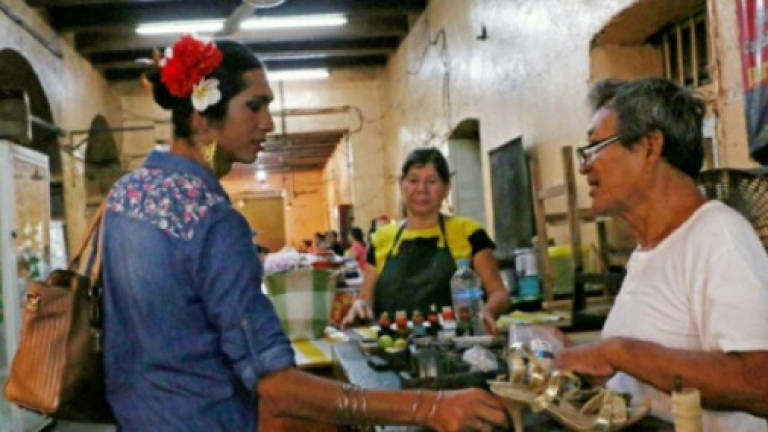In Mexico, indigenous 'third gender' pushes boundaries

ESTRELLA Velazquez towers over the crowd as she sashays in platform heels through the indigenous town of Juchitan, Mexico, seemingly impervious to the mocking catcalls behind her back.
Velazquez is a "muxe," a word long used by the Zapotec people to refer to gay men. Pronounced MOO-shay, the word can today refer to anyone born male who doesn't identify with men's traditional gender roles.
Far from ostracizing muxes, Zapotecs have traditionally considered them a "third gender" and reserved them a special place in society: initiating young men and adolescent boys into the world of sex.
But muxes, emboldened by the worldwide advance of the LGBT rights movement, are increasingly changing their names, having sex-change operations and taking on women's traditional social roles.
Their growing visibility and femininity is causing a rift in this deeply traditional community.
"We're freer and flashier now," said Velazquez, 35, the director of Juchitan's Office of Sexual Diversity.
"But there's a lot of discrimination," said the tall, brown muxe, her hair swept up in an impeccable bun punctuated by a red rose.
The problem, the traditionalists say, is not that muxes sleep with men and boys.
It is that they are encroaching on women's cultural space and wearing ceremonial women's clothing – powerful symbols in this predominantly matriarchal society.
Zapotec women are at the center of the indigenous group's sacred festivals, known as "velas" – huge parties with food, drink and dancing that last all night and can even span several days.
Women dance at these festivals in elaborate outfits known as "tehuana" dresses, a flowery, hand-embroidered garment made popular by the Mexican painter Frida Kahlo.
In recent years, some muxes have begun holding velas of their own, dressing in eye-catching, bejewelled tehuanas and the intricate, lacey white headdresses that accompany them, known as "resplandores."
That is a step too far for some Zapotecs.
"They can do whatever they want with their sexuality, but it's outrageous they're wearing our clothing," said Angelica Castillejos, who designs tehuana dresses herself.
"Everything was fine until they started dressing up," the 46-year-old woman told AFP in the Juchitan market.
Zapotec men tend to be less critical.
"It doesn't bother me" if muxes act like women, said butcher Alejandro Ruiz – drawing a furious glance from his female cashier.
Just bodies men use
Indigenous rights group Melendre estimates there are 5,000 muxes in Juchitan, a town of 75,000 people in the southern state of Oaxaca. More live in neighboring villages such as Niltepec and Ixtepec.
The group says they face increasing harassment.
"Homophobia has been fueled by the prominent role that some muxes have assumed, which has not gone down well with those who see it as detrimental to the leading role of women in Zapotec society," said the group's director, Luis Guerrero.
But even he was critical of muxes' search for greater visibility.
"It was unnecessary. Their role here was always perfectly defined ... the third gender."
He emphasized the special place occupied by muxes, who are sexually active from a young age, as the sexual initiators of young men.
"When I was in my first year of middle school (11 to 12 years old), half my classmates had already had sexual experiences with muxes," he told AFP.
Not all muxes are content with that role.
"We're just bodies men use to learn how to have sex," said Binizia Carrillo, who flamboyantly posed for AFP's cameras in full tehuana garb.
"We're just initiators. Then the men grow up and get married to biological women with vulvas and vaginas."
Muxes get little respect in return, she said.
"The local authorities abuse us, they won't let many of us change our names."
Hauling rubble, cooking meals
Muxes' special yet precarious place in Zapotec society was plain to see when an 8.2-magnitude earthquake devastated Juchitan and the surrounding region on Sept 7.
Underlining their status as a third gender, muxes both hauled away the rubble and cooked meals for victims.
But the quake, which claimed nearly 100 lives, only accentuated the discrimination they face.
Velazquez and Carrillo, who lost their homes in the quake, said muxes were refused emergency food supplies.
"So not only did we clear rubble and prepare meals with the little food we had, we organized ourselves to distribute food sent by homosexuals from other parts of the country," said Felina Santiago, the president of a muxe association that holds its own vela festivals.
She cautioned that muxes are putting that unique role at risk by trying to be "constantly more feminine."
"Some even use oils to make their behinds look bigger and stuff like that, following the (Western) standard of female beauty," she said.
"But we muxes could lose our identity." — AFP